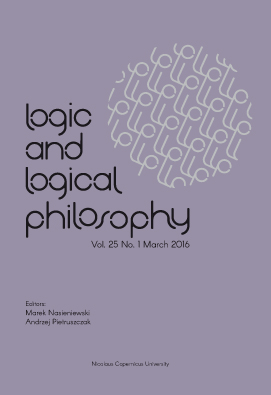Aristotle's Correspondence Theory of Truth and What Does Not Exist
DOI:
https://doi.org/10.12775/LLP.2015.016Keywords
Aristotle, correspondence, non-existence, reference, signification, isomorphismAbstract
While nowhere does he use the term to refer to his own theory, Aristotle is often thought to exemplify an early correspondence theory of truth. In the paper, I examine the textual evidence used to support the idea that Aristotle holds a correspondence theory of truth, and to infer the nuances of this theory. I hold that Aristotle’s theory of truth can account for terms that signify non-existent things, i.e., that on Aristotle’s account, an assertion is not automatically false given its subject term’s “failure to refer”. Terms do not refer for Aristotle, they signify (and his use of the concept of signification extends far beyond linguistic reference).References
Ackrill, J. L., Aristotle’s Categories and De Interpretatione, Oxford University Press, Oxford 1963.
Aristotle, Ethica Nicomachea, I. Bywater (ed.), Clarendon Press, Oxford 1894 (repr. 1962).
Aristotle, Metaphysics, 2 vols, W.D. Ross (ed.), Clarendon Press, Oxford 1924 (repr. 1970; of 1953 corr. edn.).
Aristotle, Aristotle’s De Anima Books II, III, D.W. Hamlyn (ed.), Oxford University Press, Oxford 1968.
Aristotle, The Complete Works of Aristotle: The Revised Oxford Translation, Jonathan Barnes (ed.), Princeton University Press, Princeton 1984.
Aristotle, Categoriae et Liber De Interpretatione, L. Minio-Paluello (ed.), “Oxford Classical Texts”, Oxford University Press, Oxford 2008.
Boethius, In Libro De Interpretatione Editio Secundo in Boetii Opera Omnia, J.P. Migne (ed.), 1891.
Crivelli, P., Aristotle on Truth, Cambridge University Press, New York 2004. http://dx.doi.org/10.1017/CBO9780511482496">DOI: 10.1017/CBO9780511482496
Davidson, J.D., “Appearances, antirealism, and Aristotle”, Philosophical Studies: An International Journal for Philosophy in the Analytic Tradition, 63, 2 (1991): 147–166. http://dx.doi.org/10.1007/BF00381685">DOI: 10.1007/BF00381685
Dougherty, M.V., “Aristotle’s four truth calues”, British Journal for the History of Philosophy, 12, 4 (2004): 585–609.
Hamlyn, D.W., “The correspondence theory of truth”, The Philosophical Quarterly, 12, 48 (1962): 193–205. http://dx.doi.org/10.2307/2216449">DOI: 10.2307/2216449
Kirwan, Ch., Aristotle’s Metaphysics Books Gamma, Delta, and Epsilon, Oxford University Press, Oxford 1971.
Long, Ch., Aristotle on the Nature of Truth, Cambridge University Press, New York 2011. http://dx.doi.org/10.1017/CBO9780511761096">DOI: 10.1017/CBO9780511761096
Patterson, D., “What is a correspondence theory of truth?”, Synthese, 137, 3 (2003): 421–444. http://dx.doi.org/10.1023/B:SYNT.0000004905.68653.b3">DOI: 10.1023/B:SYNT.0000004905.68653.b3
Plato, Platonis opera, vol. 1, J. Burnet (ed.), Clarendon Press, Oxford 1900 (repr. 1967).
Plato, Cratylus, tr. C.D.C. Reeve in Plato: Complete Works, J. Cooper (ed.), Hackett, Indianapolis 1997.
Plato, Sophist, tr. N.P. White inPlato: Complete Works, J. Cooper (ed.), Hackett, Indianapolis 1997.
Shields, Ch., “Review of Aristotle on truth”, Philosophical Review, 119, 2 (2010): 243–246.
Wedin, M.. “Aristotle on the existential import of singular sentences”, Phronesis, 23, 2 (1978): 179–196.
Downloads
Published
How to Cite
Issue
Section
Stats
Number of views and downloads: 3303
Number of citations: 1







